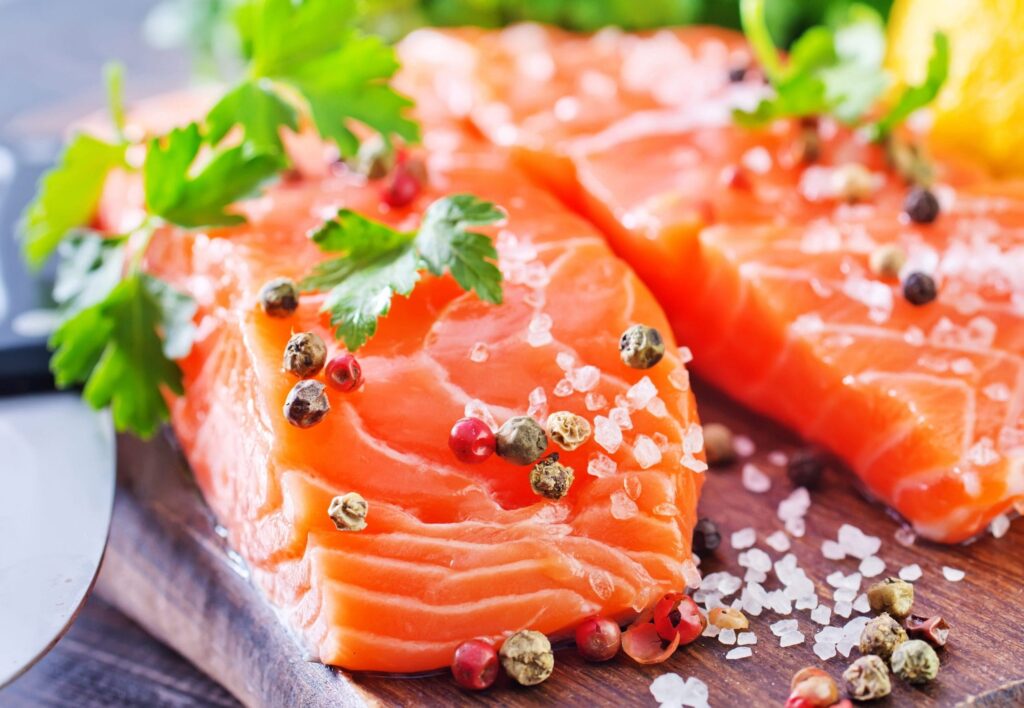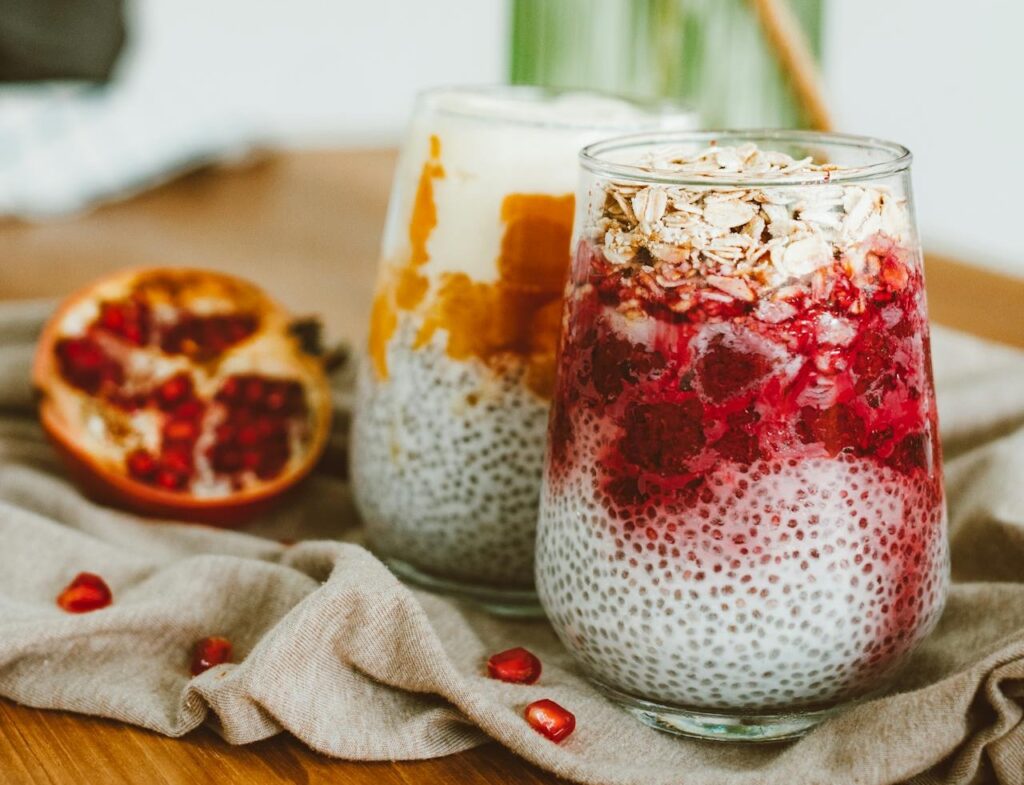Protein is a fundamental macronutrient required for muscle hypertrophy. Resistance training stimulates muscle protein synthesis (MPS), and consuming adequate protein enhances the repair and growth of muscle fibres (Phillips, 2016).
The recommended dietary allowance (RDA) for protein is 0.8g per kg of body weight, but for athletes and bodybuilders, 1.6-2.2g/kg is more effective for muscle growth (Morton et al., 2018).
The quality of protein also matters, as complete proteins containing all essential amino acids optimise MPS (Witard et al., 2016). Below are ten of the best protein sources for building muscle efficiently.
1. Chicken Breast
Chicken breast is a staple in muscle-building diets due to its high protein content and low fat. A 100g serving provides approximately 31g of protein (USDA, 2021). It is a complete protein source with all essential amino acids required for MPS.
A study by Tipton et al. (2004) demonstrated that high-quality animal protein sources like chicken breast significantly enhance muscle recovery post-exercise.
2. Eggs

Eggs contain all nine essential amino acids and are one of the most bioavailable protein sources (Puglisi & Fernandez, 2021).
A large egg provides around 6g of protein, with the yolk contributing essential micronutrients such as choline, vitamin D and healthy fats that aid muscle function. Research by Vander Wal et al. (2005) found that whole eggs improve muscle protein retention better than egg whites alone.
3. Salmon
 Source: tycoon
Source: tycoonSalmon offers around 22g of protein per 100g, along with omega-3 fatty acids, which have been shown to enhance MPS and reduce muscle protein breakdown (Smith et al., 2011). A study by McGlory et al. (2019) found that omega-3 fatty acids from fish sources enhance the anabolic response to training, making salmon a superior protein choice.
4. Greek Yoghurt
Greek yoghurt provides 10g of protein per 100g, with a blend of casein and whey proteins that support muscle repair (Gorissen et al., 2018). Research shows that casein digests slowly, providing a sustained amino acid release, while whey is rapidly absorbed, maximising post-exercise recovery (Churchward-Venne et al., 2017).

5. Lean Beef
Lean beef is rich in protein (26g per 100g) and supplies creatine and iron, which enhance muscle strength and oxygen transport, respectively (Hector & Phillips, 2018). A study by Symons et al. (2007) found that consuming lean red meat as part of a resistance training programme significantly increases lean muscle mass.
6. Whey Protein
Whey protein is a fast-digesting complete protein derived from milk, containing around 25g per scoop (30g serving). It is high in leucine, the key amino acid in triggering MPS (Churchward-Venne et al., 2012). Research indicates that post-exercise whey supplementation enhances muscle recovery and strength gains (Tang et al., 2009).
7. Cottage Cheese
Cottage cheese contains around 11g of protein per 100g and is predominantly casein, which provides a slow and sustained release of amino acids (Boirie et al., 1997). This makes it an excellent option before bed to prevent overnight muscle protein breakdown.
8. Lentils
Lentils offer a plant-based protein alternative, supplying 9g per 100g. They also contain fibre and iron, supporting overall health (Messina, 2014). Research by Gorissen et al. (2018) suggests that while plant-based proteins generally have a lower leucine content, combining them with complementary sources like quinoa or rice enhances their muscle-building potential.
9. Tuna
Tuna provides 29g of protein per 100g and is low in fat. It is also rich in B vitamins, which assist in energy metabolism and muscle function (Sanchez et al., 2016). A study by Murphy et al. (2015) found that frequent consumption of lean fish sources like tuna is linked to greater muscle maintenance in active individuals.

10. Tofu
Tofu, derived from soybeans, supplies 8g of protein per 100g and contains all essential amino acids (Hoffman & Falvo, 2004). Soy protein has been shown to support muscle growth comparably to animal proteins when intake is sufficient (Phillips, 2016). A study by Tang et al. (2010) suggests that soy protein, combined with resistance training, promotes similar hypertrophic responses as whey protein.
Conclusion
The best protein sources for muscle growth provide high-quality, bioavailable amino acids that stimulate MPS effectively. Combining different sources, such as lean meats, dairy, fish and plant-based proteins, ensures optimal protein intake and muscle recovery. Supplementing with whey or casein can further support muscle growth when whole food sources are insufficient.
Key Takeaways
| Protein Source | Protein per 100g | Benefits |
|---|---|---|
| Chicken Breast | 31g | High-quality complete protein with all essential amino acids |
| Eggs | 6g per egg | High bioavailability and nutrient-rich |
| Salmon | 22g | Contains omega-3s, which reduce muscle breakdown |
| Greek Yoghurt | 10g | Casein and whey combination for sustained MPS |
| Lean Beef | 26g | Rich in creatine and iron for muscle strength |
| Whey Protein | 25g per scoop | Rapidly absorbed with high leucine content |
| Cottage Cheese | 11g | Slow-digesting casein ideal for overnight muscle retention |
| Lentils | 9g | Plant-based protein with fibre and iron |
| Tuna | 29g | Lean protein source with essential B vitamins |
| Tofu | 8g | Complete plant protein with muscle-building potential |
References
Boirie, Y., et al. (1997). Slow and fast dietary proteins differently modulate postprandial protein accretion. Proceedings of the National Academy of Sciences, 94(26), 14930-14935.
Churchward-Venne, T. A., et al. (2012). Leucine supplementation of a low-protein mixed macronutrient beverage enhances myofibrillar protein synthesis in young men: A double-blind, randomized trial. American Journal of Clinical Nutrition, 96(6), 1451-1459.
Gorissen, S. H., et al. (2018). The muscle protein synthetic response to food ingestion in young and elderly men. American Journal of Clinical Nutrition, 108(6), 1083-1096.
Hector, A. J., & Phillips, S. M. (2018). Protein recommendations for weight loss in elite athletes: A focus on body composition and performance. International Journal of Sport Nutrition and Exercise Metabolism, 28(2), 170-177.
McGlory, C., et al. (2019). Omega-3 fatty acids and skeletal muscle health. Marine Drugs, 17(4), 190.
Morton, R. W., et al. (2018). A systematic review, meta-analysis, and meta-regression of the effect of protein supplementation on resistance training-induced gains in muscle mass and strength in healthy adults. British Journal of Sports Medicine, 52(6), 376-384.
Phillips, S. M. (2016). The impact of protein quality on the promotion of resistance exercise-induced changes in muscle mass. Nutrition & Metabolism, 13(1), 64.
Witard, O. C., et al. (2016). Myofibrillar muscle protein synthesis rates with low and high dose whey protein ingestion after resistance exercise. American Journal of Clinical Nutrition, 104(2), 257-264.






